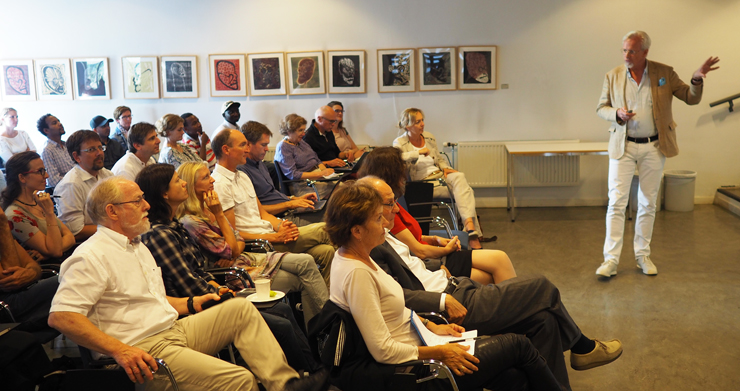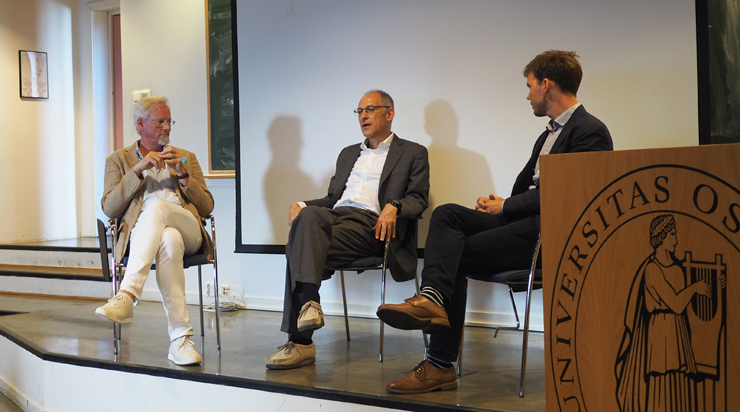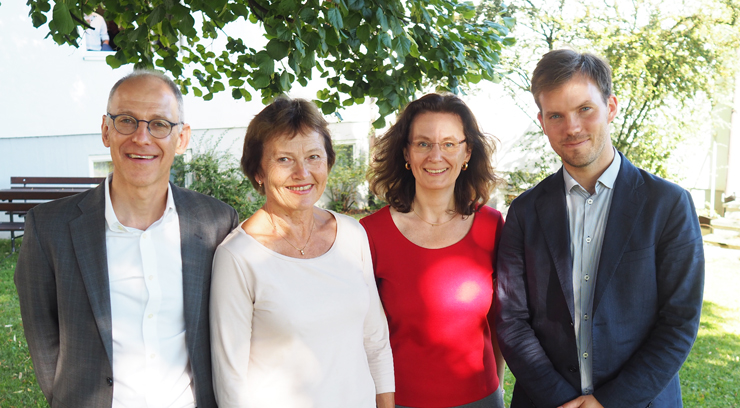The Universal Declaration on Bioethics and Human Rights Article 15 states that:
Benefits resulting from any scientific research and its applications should be shared with society as a whole and within the international community, in particular with developing countries.
However, given scarcity of resources, not all best treatments developed through scientific research are available to developing nations. This raises the following questions: Is it ethical to provide more affordable, but second best, i.e. less effective or more toxic, care to people in developing nations? And, given that developing nations cannot afford all the fruits of scientific research, what are the ethical implications of clinical research in developing nations?
The Centre for Medical Ethics together with the Centre for Global Health at the Institute of Health and Society, University of Oslo, invited Professor Ezekiel Emanuel, a bioethicist at the University of Pennsylvania and the Center for American Progress, to present a debate on the ethics of providing “second best” treatment and conducting clinical research in developing nations. Professor Jan Helge Solbakk from the Centre for Medical Ethics, Institute of Health and Society, University of Oslo presented the contra-arguments on the debate.
What is “second best treatment”?
In his talk and recent publication, Professor Emanuel invokes an example of treatment for HIV/AIDS. The current preferred antiretroviral therapy (ART) for treating HIV/AIDS is tenofovir, which was developed and marketed by Gilead Sciences and approved by the FDA in 2011. Prior to that, HIV/AIDS was treated by an equally effective but more toxic pharmaceutical, stavudine. Because of its side effects, including peripheral neuropathy, lactic acidosis and lipodystrophy[1], in 2010, the World Health Organisation (WHO) recommended that countries phase out the use of stavudine.
Professor Emanuel argues that it is ethical to conduct a trial to see if lower dose stavudine is equally effective as tenofovir and has lower side effects because stavudine’s lower price would allow more HIV/AIDS patients to be treated in developing nations.
What are the benefits of using second best treatments in developing nations?
Continuing with the example of HIV/AIDS treatment, Professor Emanuel highlights that out of 35 million people who suffer from the disease, less than half of them (15 million) are receiving treatment. The other 20 million, in countries such as South Africa or Nigeria, have no access to any treatment at all. The cost of HIV/AIDS treatment is an unrealistic burden for low-income countries and global health assistance has been relatively flat since around 2010.
To expand access to “cheaper, less effective or more toxic treatment to many who would otherwise go untreated will better decrease inequality than provision of the best care to a few patients.” – writes Emanuel[1]. Professor Emanuel argues that the three basic principles of justice: utility (greatest good for the greatest number), equality (equal access for all) and priority for those worst off (access for the most disadvantaged) all support providing less effective or more toxic treatments to more patients in developing countries.
What are the ethical challenges to providing second best treatment?

Professor Jan Helge Solbakk emphasized that in an unequal world, “we are often outside the ethical terrain – we are in a tragic situation where a choice must be made. All choices”, he continued, “will have some drastic consequences.” Accepting a “second best treatment” to reach a larger population, he says, does not constitute an ethical free choice, but rather the best available option of several bad options.
The question of whether some people do not deserve the best treatment, because of their place of birth or socioeconomic status, goes right to the heart of the Universal Declaration of Human Rights, which states that: “all human beings are born free and equal in dignity and rights” (Article 1) “without distinction of any kind such as … national or social origin…” (Article 2). That is the premise by which we are united, and any disregard for this basic premise has often resulted in great injustice towards people. To accept that it is ethical to treat people born to financial disadvantage with a less effective or more toxic treatment than what people born in high-income countries have access to, is to denounce the core of equality and justice.
Considering the previous example of tenofovir – between 2001 and 2011, the treatment had generated more than $31 billion revenue at a gross margin of 81% for the pharmaceutical company that patented it, Gilead Sciences[2]. Could an alternative question, in this case, be “is it ethical for large pharmaceutical companies to profit from low-income countries at the cost of denying treatment to millions who cannot afford the current best available treatment?”
What about the ethics of conducting clinical research in developing nations?
Article 20 of the current version (2013) of the Declaration of Helsinki, the foundation of ethical conduct in medical research, states that:
“Medical research with a vulnerable group is only justified if the research is responsive to the health needs or priorities of this group and the research cannot be carried out in a non-vulnerable group. In addition, this group should stand to benefit from the knowledge, practices or interventions that result from the research.”
In support of that, in one of his earlier works Professor Emanuel writes that a research study must be designed to be useful in the developing country where it is performed[3]. So, on the one hand, if stavudine were deemed as an acceptable treatment in developing nations, then carrying out clinical trials to test a lower dose of the drug and assess effectiveness and toxicity would constitute “ethical research”, as the population in which the drug is tested would directly benefit from the clinical trials. However, there are several dangers in, firstly, assuming that stavudine is an acceptable treatment when other, better treatments are available, as discussed above, and secondly the inherent ethical connotations of conducting research in poor communities, described below.
Risk of exploitations
“Benefits should not constitute improper inducements to participate in research.” When negotiating benefits to communities and study participants, Professor Solbakk argues that there are high risks of asymmetrical bargaining. That is, the benefits received by the community from research may not be the outcomes of the research such as novel therapeutics, but instead, providing local clinics with medical supplies or participating in a study where some form of treatment is offered, when no alternative treatment would otherwise be available at all. Poverty, limited health-care, illiteracy and limited understanding of scientific research all increase the possibility of such exploitation [3].

Informed consent
The quality of informed and voluntary consent is put to question when a potential participant is given the choice between being part of a clinical trial and receiving a yet un-tested treatment, or receiving no treatment as an alternative. As this would likely be the case with patients in developing nations where many patients are untreated for HIV, care must be taken that quality informed consent is obtained from participants.
Benefit of research to the population
Where the treatment that is tested is designed to benefit the population it is assessed in, there seem to be few arguments against the clinical trials. However, Professor Solbakk argues that there are hundreds of studies outsourced to developing nations in order to reduce costs, benefit from lax ethical guidelines and ease of recruiting participants, where the outcome of the research will not benefit the community.
Conclusions
“If services are to be provided for all, then not all services can be provided” – WHO director, Gro Harlem Brundtland.
Decisions on whether certain second best treatments should be used in developing nations heavily depend on the disease, the treatments available and the political, financial and logistical capacity to obtain and provide these treatments. In many cases, it is certainly justified to treat more patients with less effective drugs, rather than to limit the best drugs to only those who can afford it. However, while Professor Emanuel argues that this is a fair and just distribution, Professor Solbakk’s position is that we cannot accept this reality as being ethical and just, and that we must be more ambitious in our pursuit of equality.
You are invited to have your say on this debate, you can comment on the Centre for Global Health Facebook page or Twitter.
References
- [1] Persad, Govind C, Emanuel Ezekiel J (2016) The ethics of expanding access to cheaper, less effective treatments. The Lancet , Volume 388 , Issue 10047 , 932 - 934
- [2] David Walwyn (2013) Patents and profits: A disparity of manufacturing margins in the tenofovir value chain. African Journal of AIDS Research, 12(1): 17–23
- [3] Emanuel, EJ, et. al. (2004) What Makes Clinical Research in Developing Countries Ethical? The Benchmarks of Ethical Research. The Journal of Infectious Diseases;189:930–7

